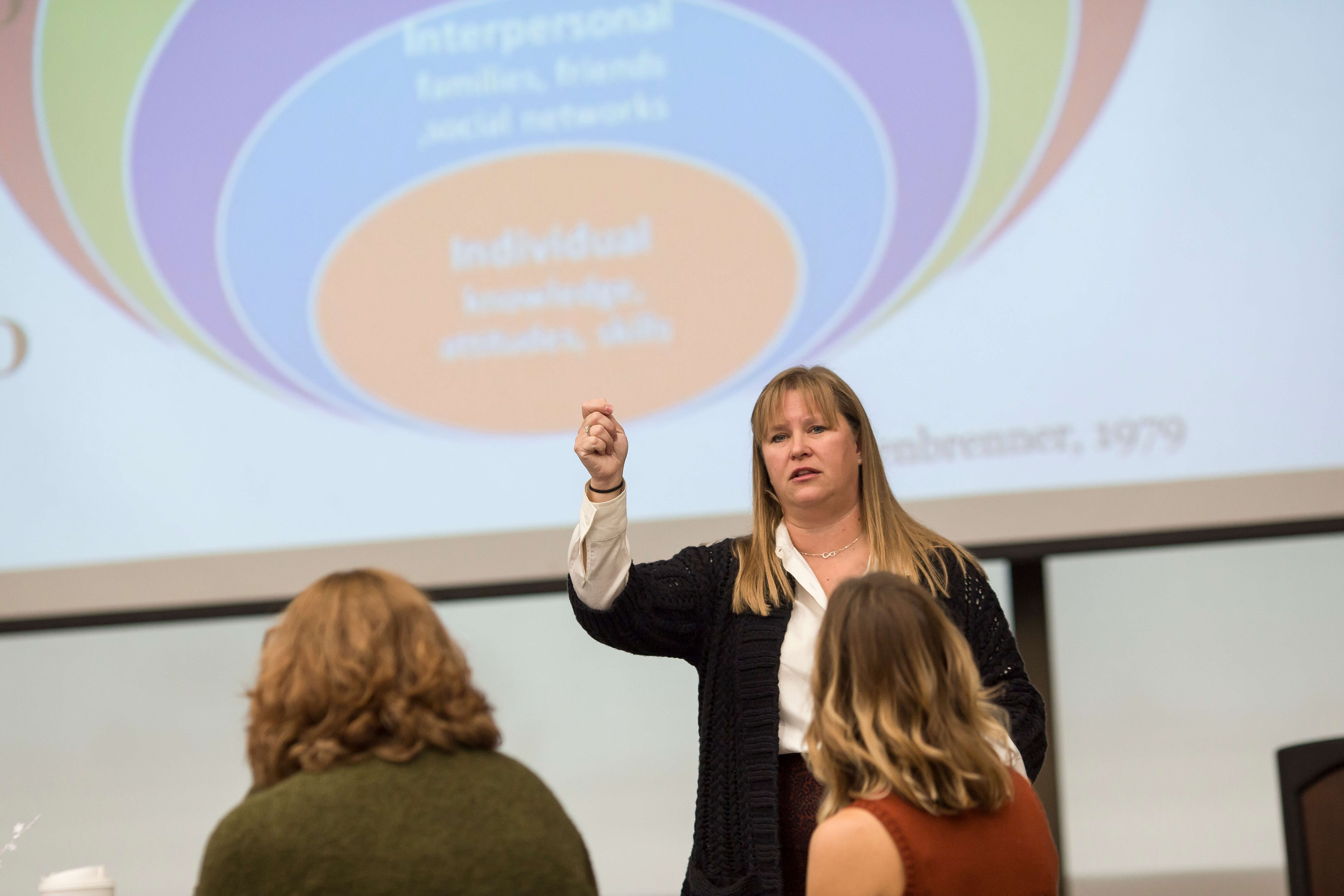Monmouth receives prestigious federal grant funding for a second time
WEST LONG BRANCH, N.J. (Sept. 6, 2018)— Monmouth University is launching a new, federally funded effort to create a stronger, broader infrastructure to prevent suicides on campus. Michelle Scott, Ph.D., associate professor and director of the SRF Suicide Prevention Research and Training Project in the School of Social Work at Monmouth will be leading the “Connect to Wellness: a Competent Community Initiative” as the principal investigator.
The grant project, “Connect to Wellness,” is designed to better serve young adults on campus by increasing the connection between students and services, strengthening the linkages between general health, mental health, and substance abuse resources on campus, and fostering collaboration with local providers. A key part of the project is the development of a “one-stop shop” type of web-portal for all things wellness and safety on campus for students, staff and faculty to identify resources on campus. In addition, the campus will increase its utilization of electronic medical records in accordance with all federal privacy guidelines allowing real-time information about health-related services utilization across campus and, for military-affiliated students increasing communication with off-campus resources. This comprehensive view of a student’s health history can help providers on campus identify and serve the needs of the student body before a crisis occurs.
While suicide has consistently remained a leading cause of death of college students, behind accidents, the rates of mental health challenges as well as suicidal behavior of college students have increased. The most recent American College Health Survey reports that 62 percent and 68 percent of students report “overwhelming anxiety” and “feeling very sad,” respectively, in the past 12 months. Two-fifths (40 percent) of students reported that this sadness made it difficult for them to function. Just under 12 percent of students reported thinking of killing themselves with 1.7 percent of students reporting a suicide attempt in the prior 12 months. Based on the Center for Collegiate Mental Health’s annual report, college counseling centers have reported a 30 to 40 percent increase in service use over the past seven years. Students with anxiety, depression and “threats to self,” i.e., self-injury, thoughts of suicide and suicide attempts, lead the utilization of campus mental health services.
“A strong network and sense of belonging to a community can help to decrease suicide risk,” said Scott. “Relatively speaking, college students have a lower rate of suicide than their peers who are not enrolled in college because they have a built-in community. However, campuses across the country are seeing a need to make changes to their mental health programming to help support students with anxiety and depression. Our work with this grant is focused on strengthening the community infrastructure to better support these students.
“The ‘Connect to Wellness’ grant will institute a variety of approaches to help address the mental health needs of students with additional attention to military-affiliated and transfer students. By improving the infrastructure of our campus services through early identification, screening, and online therapy assist programming, Monmouth hopes to increase access to services prior to the need for crisis intervention.”
“Connect to Wellness” is funded by the federal Substance Abuse and Mental Health Services Administration (SAMHSA), with matching funds from the university. Dr. Scott was notified by SAMHSA in July that Monmouth was, for the second time, a recipient of the Garrett Lee Smith Campus Suicide Prevention Grant. The $101,963 award is renewable for up to three years, totaling nearly $306,000, which the university will continue to match. “It is a great honor for Monmouth to have received a Garrett Lee Smith grant for a second time,” said Scott. “Since SAMHSA began funding these grants in 2005, only 8 percent of campuses have ever received the grant a second time. Receiving this funding not once, but twice is a true testament to the work of Monmouth University and the commitment Monmouth has to student mental health and safety.”
Monmouth University was a previous recipient of the Garrett Lee Smith Campus Suicide Prevention Grant for a project co-directed by Scott from 2012-2016. The grant program memorializes Garrett Lee Smith, son of former Oregon Sen. Gordon Smith. After his son’s death by suicide in 2004 on the day before his 22nd birthday, Sen. Smith proposed the Garrett Lee Smith Memorial Act, which recognized suicide as the third leading cause of death among youth ages 10 to 24 at the time. Unfortunately, this rate has since moved to the second leading cause of death for this age group. Eventually, the Act would allow campuses, tribes, and states to apply for and receive grants to help them prevent tragedies like Garrett’s from devastating other families.
The earlier grant funds were used to support the Promoting Wellness and Resiliency program at Monmouth University. The program was a university and community partnership designed to enhance prevention, identification, and service utilization for all students, particularly those with mental and behavioral health problems, which elevate their risk for suicide ideation, attempts, and completions. More than 2,500 gatekeepers, including counselors, faculty, administrators, and others from both on campus and in the surrounding community received training through the program during the grant term.
September is National Suicide Prevention Awareness Month—a time to share resources and information, support individuals and families affected by suicide, raise awareness, and connect individuals with suicidal ideation to treatment and support. If you or someone you know is in an emergency, call 911 immediately. If you are in crisis or are experiencing difficult or suicidal thoughts, call the National Suicide Prevention Hotline at 1-800-273 TALK (8255). For additional resources and training opportunities, please visit the SRF Suicide Prevention Research and Training Project website at www.monmouth.edu/school-of-social-work/srf/.

